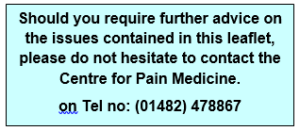- Reference Number: HEY942/2023
- Departments: Pain Medicine
- Last Updated: 30 April 2023
Introduction
This leaflet is a summary of some information, which may be of help to you. Always check with the manufacturer’s information leaflet given with your medicine, which has more information.
You have been given this leaflet because you have been prescribed Duloxetine tablets for pain relief. This leaflet has been produced to give you general information about your treatment. Most of your questions should be answered by this leaflet. It is not intended to replace the discussion between you and your doctor, but may act as a starting point for discussion. If after reading it you have any concerns or require further explanation, please discuss this with a member of the healthcare team caring for you.
What is Duloxetine and what is it used for?
Duloxetine can be used to treat different types of persistent pain. It is especially good for nerve pain, such as burning, shooting or stabbing pain, and for pain that keeps you awake at night. Duloxetine belongs to the group of medicines called Serotonin Noradrenergic Reuptake Inhibitors (SNRI) that are also used to treat depression. Duloxetine works by increasing the amount of specific nerve transmitters in the nervous system, this then reduces the pain messages arriving in the brain.
When should I take it?
It is best to take Duloxetine at the same time each day, usually in the morning.
If you find it makes you drowsy try taking it in the evening.
How do I take Duloxetine tablets?
The tablets should be swallowed whole with water on an empty stomach.
How long will it take to work?
You may feel a slight effect after 1 week but it may take up to 1 month to feel the full effect. The dose may need to be increased to gain maximum effect; your doctor / specialist nurse will advise you regarding this.
Duloxetine does not always work for everyone, however if you do not feel any benefit from this medication, do not stop it suddenly but, it should be weaned gradually. Discuss with your doctor before weaning.
Can there be any side effects or risks?
The most common side effect for this medicine is drowsiness, which usually lasts a few days. If the drowsiness occurs, you should not drive or operate machinery, until the drowsiness stops. You must inform the DVLA if you are on medicines which may affect your driving.
Other common side effects include dry mouth, diarrhoea and constipation. If you become constipated, tell your doctor/nurse/pharmacist and they will be able to recommend how you can change your diet or which medicine to take to treat your constipation.
If you experience any other side effects (anything unusual for you within a few days of starting the medicine) you should stop taking Duloxetine and inform your doctor.
ALCOHOL
The combination of Duloxetine and alcohol can cause significant drowsiness if you have just started on this medicine or the dose has recently been increased. You are advised not to drink alcohol when you first start this medicine and while the dose is being increased. Once you are on a stable dose and the drowsiness caused by the Duloxetine stops, you may drink alcohol.
OTHER MEDICATION
Duloxetine can interact with other medicines, e.g. warfarin, tramadol and herbal products. Always tell your doctor, nurse or pharmacist which other medicines you are taking or buying, so they can make sure there are no interactions between your medicines.
Please read the information leaflet. Share the information it contains with your partner and family (if you wish) so that they can be of help and support. There may be information they need to know, especially if they are taking care of you following this examination.
What dose should I take?
DOSE
30 to 60 mg daily (usually at night)
DISCONTINUATION
If you experience any side effects whilst taking your Duloxetine (apart from drowsiness which is usually temporary), please reduce the dose back to the level where you had no side effects or discontinue this medicine; however, to discontinue this medicine it is best to reduce the dose slowly over 1 to 2 weeks by reducing the dose by 10 to 20mg every few days.
For example: if you are taking 60 mg at night
Day 0 60mg
Day 1 60mg on alternate days (e.g day 2 and day 4)
Day 5 60mg every third day (e.g. day 7 and day 10)
Day 10 STOP
If you are taking higher doses, reduce by 60mg per day until your daily dose is 60mg, continue your reduction by taking Duloxetine 60mg on alternate days for 4 days then stop.
However, if you are concerned about any side effects e.g. if you get a rash, swelling etc, speak to your Doctor/Pharmacist/Nurse as you may need to stop this medicine immediately. If you have any doubts/concerns and cannot speak to a health care professional, stop the medicine. Some people can stop this medicine suddenly and have no problems; however some people may get withdrawal symptoms if it is stopped suddenly such as insomnia, headache, flu syndrome, anxiety etc which should only last a few days. These symptoms are more likely to occur if people have been on this medicine for more than a few months.
What happens if I overdose?
Seek emergency medical attention or call the Poison Help line at tel: 1 800 222 1222.
What happens afterwards?
You will be followed up after trialling this medication by a specialist nurse by a telephone review.
This leaflet was produced by the Pain Services Department, Hull University Teaching Hospitals NHS Trust and will be reviewed in (April 2026)
General Advice and Consent
Most of your questions should have been answered by this leaflet, but remember that this is only a starting point for discussion with the healthcare team.
Consent to treatment
Before any doctor, nurse or therapist examines or treats you, they must seek your consent or permission. In order to make a decision, you need to have information from health professionals about the treatment or investigation which is being offered to you. You should always ask them more questions if you do not understand or if you want more information.
The information you receive should be about your condition, the alternatives available to you, and whether it carries risks as well as the benefits. What is important is that your consent is genuine or valid. That means:
- you must be able to give your consent
- you must be given enough information to enable you to make a decision
- you must be acting under your own free will and not under the strong influence of another person
Information about you
We collect and use your information to provide you with care and treatment. As part of your care, information about you will be shared between members of a healthcare team, some of whom you may not meet. Your information may also be used to help train staff, to check the quality of our care, to manage and plan the health service, and to help with research. Wherever possible we use anonymous data.
We may pass on relevant information to other health organisations that provide you with care. All information is treated as strictly confidential and is not given to anyone who does not need it. If you have any concerns please ask your doctor, or the person caring for you.
Under the General Data Protection Regulation and the Data Protection Act 2018 we are responsible for maintaining the confidentiality of any information we hold about you. For further information visit the following page: Confidential Information about You.
If you or your carer needs information about your health and wellbeing and about your care and treatment in a different format, such as large print, braille or audio, due to disability, impairment or sensory loss, please advise a member of staff and this can be arranged.


